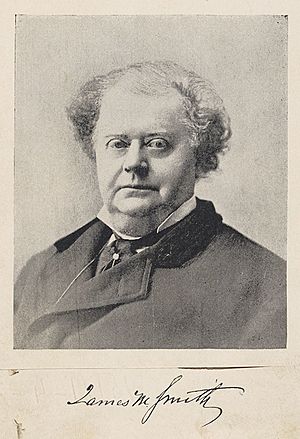James Milton Smith facts for kids
Quick facts for kids
James Milton Smith
|
|
|---|---|
 |
|
| 48th Governor of Georgia | |
| In office 1872–1877 |
|
| Preceded by | Benjamin F. Conley |
| Succeeded by | Alfred H. Colquitt |
| Speaker of the Georgia House of Representatives | |
| In office 1871–1871 |
|
| Preceded by | Robert McWhorter |
| Succeeded by | Joseph B. Cumming |
| Personal details | |
| Born | October 24, 1823 Twiggs County, Georgia |
| Died | November 25, 1890 (aged 67) Columbus, Georgia |
| Political party | Democratic |
James Milton Smith (born October 24, 1823 – died November 25, 1890) was an important figure in Georgia's history. He served as a Confederate colonel during the American Civil War. After the war, he became the Governor of Georgia. His time as governor helped the state recover after a difficult period.
Contents
Early Life and Education
James Milton Smith was born in Twiggs County, Georgia. He went to school at the Culloden Academy in Monroe County. In 1846, he became a lawyer and opened his first office in Columbus, Georgia. He tried to become a U.S. Representative in 1855 but did not win.
Military Service in the Civil War
When the Civil War began, James Milton Smith joined the Confederate Army. He started as a captain in the 13th Georgia Infantry. He was later promoted to major, and then to colonel in 1862.
Colonel Smith led his regiment during the Gettysburg Campaign. His troops marched close to the Susquehanna River. They then returned to fight in the major Battle of Gettysburg. In 1864, he was badly hurt during the Battle of Cold Harbor. He went back to Georgia to get better.
Political Career and Governorship
After recovering from his injury, Smith left the army to enter politics. He was chosen as a delegate for the Confederate Congress. This was until the war ended in 1865. He then started a very successful law firm in Columbus, Georgia.
In 1870, he was elected to the Georgia Legislature. He spoke out against the "Radical Reconstruction" policies. The next year, he became the Speaker of the Georgia House of Representatives.
Governor of Georgia (1872-1877)
James Milton Smith was elected Governor in 1872 without anyone running against him. He took over from acting Governor Benjamin F. Conley. Many people saw his inauguration on January 12, 1872, as a sign that Reconstruction was ending in Georgia. It also marked the return of the Democratic Party's power.
He was reelected in 1874 and served until 1877. During his second term, he was a delegate at the Democratic National Convention in 1876.
Key Achievements as Governor
As governor, Smith achieved several important things. He helped improve Georgia's financial standing. He did this by canceling bonds that were not valid. He also lowered state spending. This helped pay off the state's debt. When he left office, the state treasury even had extra money.
He supported creating a state department for agriculture. He was also known for choosing the best people for jobs in his government. This was different from the common practice of giving jobs to friends or supporters.
It is important to know that in 1876, Smith made unfair comments about African Americans. He described them in ways that were not equal or respectful. A group called the Equal Justice Initiative later pointed out that African Americans made up a large part of the people he governed.
Later Political Roles
In 1877, Smith tried to become a U.S. Senator but was not successful. He was then named the first chairman of the new Georgia Railroad Commission. He served in this role for six years.
He went back to his law career. His former Civil War commander, John B. Gordon, appointed him as a Judge for the Chattahoochee Circuit of the Superior Court. He served as a judge from 1888 until 1890.
Personal Life and Legacy
James Milton Smith was married two times. His first wife was Sally Marshall Welborn. After she passed away, he married Hester Ann R. Brown.
Smith died on November 25, 1890. He was buried in Alta Vista Cemetery in Gainesville, Georgia. The Atlanta Constitution newspaper praised him after his death. They called him "one of the boldest and most fearless men in the history of Georgia."
The James M. Smith Science Hall at the State Normal School in Athens was named in his honor.
 | Madam C. J. Walker |
 | Janet Emerson Bashen |
 | Annie Turnbo Malone |
 | Maggie L. Walker |

